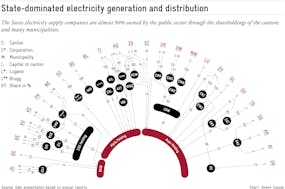The mobility of factors of production, major improvements in information and transportation technology are rapidly changing the nature of local, regional and global commerce. The movement of goods and people has increased significantly since the end of World War II. Economic globalization is, however, not a linear process. The recent emergence of populist political forces in the West is reversing some benefits of closer global integration. Globalization and inequality are important in explaining the proximate causes of Brexit and Donald Trump’s election victory.
These current developments are a profound challenge for Western democracies. Despite the perceived re-nationalization of politics, the issues of economic policy in a globalized world can only be solved at the international level. This holds even more for free trade and migration, the two main topics of Avenir Suisse’s recent Think Tank Summit held on 27-28 January 2017 at the Zurich Airport.
The international summit offered think-tankers from the USA, Great Britain, Belgium, Germany, France and Switzerland the opportunity to analyze the changing geopolitical framework. As emphasized by Avenir Suisse’s director, Peter Grünenfelder, at the official opening, “the current international political developments pose a major challenge for liberal democracies and economies. Switzerland, in particular, would be affected by a new protectionist era.” This newsletter summarizes some of the crucial points raised at the 2017 Think Tank Summit and provides an overview of the current challenges to globalization.
Free Trade
The future of free trade looks very gloomy. In the most recent biannual trade outlook report, the World Trade Organization cut its trade growth forecast to 1.7 %, down from 2.8 % at the beginning of 2016, a move that it partially attributed to China’s economic slowdown and falling levels of US imports. Given that global trade continues to slow down, political commentators suggest that a response is likely to lead to a rise in trade protectionism. The USA serves as a perfect example to illustrate this recent shift in economic ideology. Since immediately after World War II, the United States was at the forefront of a liberal effort to remove trade barriers and open international trade. Ironically, currently it is in the USA where this commitment to free trade and open markets is being challenged. Trade deals were a more prominent US election campaign topic than at any other time in a generation. Populist movements within the Democratic and Republican parties profited from the growing fear of free trade and a growing sentiment that trade deals like the North American Free Trade Agreement have left American workers behind. With the new US president Donald Trump’s pledge to pull out of existing trade deals and place future ones on hold, difficulties with the EU, the WTO, and especially China, are virtually pre-programmed. Even though Trump’s attitude towards the US economy has in many ways unsettled geopolitics, the true impact of his policies on global trade remains to be seen.
Things are not looking much better on the other side of the Atlantic. Even before Trump was elected, last year’s Brexit vote came as a shock to a lot of people and may have huge implications for the UK now and for many years to come. Britain’s negative vote on its EU membership doesn’t seem to be based on a solid case regarding UK’s economic wellbeing and trade. Taking greater control of borders was the main argument on which Brexit was orchestrated, wishfully thinking it would also rejuvenate the domestic economy and maybe even foreign trade. As the UK prepares to give formal notice of its intention to leave the EU in March, economists all over the world are waiting impatiently to see how the departure will affect the country that basically invented the economic ideals of free trade and economic liberalism. It must however be stated that the majority of Brexit supporters were not against free trade, but against how deeper political integration with the EU affected Britain’s decision making. After the eventual implementation of Article 50, Great Britain will only have two years for the signing of new trade treaties with the EU. Although much has been made of potential “Hard” and “Soft Brexit” strategies, any form of contractual vacuum with the EU will place the island state in great economic uncertainty for years to come.
As the EU’s third largest trading partner, Switzerland has been keeping a close eye on global trade developments. As a small, open economy, Switzerland earns most of its income abroad. Switzerland is one of the countries with the highest contribution of foreign trade to gross domestic product. For Switzerland, the recent US election result surpassed the initial shock and significance of last June’s Brexit vote. With the now likely delaying of TTIP, the priorities for Switzerland have changed. Asia will become a growing priority for Swiss exports. Despite the potential changes to Atlantic trade, Switzerland should continue to rely on its proven strategy of openness, intensifying existing free trade agreements and concluding new ones.
Migration
The permanent movement of people over national borders is an even more emotional and controversial topic than trading goods or services. Whereas Western countries have shown relative willingness to cooperate on exchanging goods and capital, the international community has shown little urgency for improving how it regulates human mobility. The general public opinion towards migration is also largely negative. A recent broad survey carried out in 16 European countries showed that 60% of the respondents were critical towards the cross-border migration of people. This certainly has, and will continue to have, a strong impact on what politicians (not only populist politicians) say about migration.
Many migrants are searching for jobs because they have missed out on globalization’s unequally distributed gains, and they see no future for themselves if they remain where they currently live. Countless others are being displaced by violent conflicts and natural disasters. In current hot spots such as the Middle East and parts of Africa, uncertainty over economic, social and territorial cohesion is forcing people to leave their countries in droves. The recent refugee crisis in Europe is testing the EU’s political stability as countries evaluate their solidarity with the greatest humanitarian crisis since World War II. The ongoing debates about a common European response have left Italy and Greece, the two countries at the forefront of the crisis, in a political limbo.
The sources of migrants are also bound to change. The immigrants to Europe are increasingly likely to come from the Middle East, but even more so, Africa. Incomes in many African countries are rising quickly, meaning that more people can afford to migrate to Europe or North America. Numerous African countries are still in the turmoil of civil war or decades of dictatorship, from which thousands, if not millions, will try to escape. Nigeria, Africa’s most populous country and source of migrants, could see further increases in emigrants if current violence in the north of the country expands.
Is Europe and North America ripe for even more mass immigration? The current wave of immigration could in fact help the industrialized North deal with declining birth rates and fewer working age citizens. Although this is a very credible solution for Europe’s declining economic potential, the demographic argument for immigration’s benefits ignores the fact that it will be difficult to control the numbers of immigrants, and many would arrive with low education levels that would ultimately result in lower earning potential. It also remains to be seen what becomes of multi-cultural societies. The Swiss writer, Max Frisch, once noted that, “We asked for workers. We got people instead.” As large numbers of immigrants become considerable political forces in many countries, will the proverbial “clash of civilizations” destabilize an already fragile EU? What is however certain is that Europe and North America need to embrace new cultural identities in a changing global economy.
Switzerland, in particular, serves as an interesting case study illustrating the successful economic integration of migrants. Despite the approval of the 2014 initiative against “mass immigration” with 50,3% voting in favour of introducing quotas on migrants, there was a growing impression that Switzerland remains a very open country and society. Currently, 28% of the Swiss residents are foreign born, and almost half of the population has a migration background, meaning that at least one parent was born outside the country. The exceptionally high standards of living in Switzerland are the major pull-factor for migrants. As the flow of refugees to Europe continues, the excessive length of the application process, combined with Switzerland’s high asylum approval rate (over 50% success rate), makes rapid social integration indispensable. The country’s flexible labour market and extensive apprenticeship programme creates multiple opportunities to integrate refugees. Although some aspects of the labour market’s regulation decreases the opportunities in the low-wage segment, incentives through education, social welfare and professional training encourage refugees and other migrants to generate resources by themselves. Switzerland remains very active for refugee integration and envisions their economic participation, trying to turn the current refugee crisis into an economic opportunity.
Coming to terms with globalization
As the pace of globalization continues to increase, new opportunities and challenges will arise for leaders and local communities. Globalization has brought immense benefits to many sectors, certain countries and population groups. However, the election of Donald Trump provokes a re-evaluation of the future of globalization and challenges our earlier optimism that the open global economic order will endure. Brexit and the Trump election being just the two most recent political blows, forces workers, consumers, citizens, and investors to change their perceptions of globalization. As rising economies like China and India redefine the future of global economic growth, globalization still has the potential to make a lot of people much better off. These new challenges for globalization have to be addressed.





